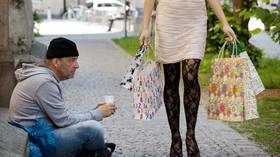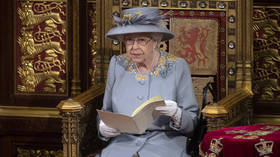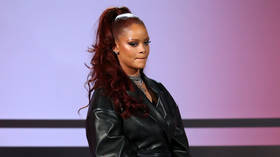'A poison for social cohesion’: German govt’s wealth report shows disparity between rich & poor is ‘solidifying’

Low-income families in Germany have ever fewer chances of climbing out of poverty, the German government’s latest poverty and wealth report confirms, in what Berlin’s critics describe as a testament to inequality.
A long-term poverty trend has been “solidifying” in Germany in recent decades, the sixth Wealth and Poverty Report published by the ministry for labor and social issues says.
The likelihood that someone currently living in poverty “would still be poor five years from now has increased from 40 to 70 percent since the late 1980s,” the document, released on Wednesday, says.
Also on rt.com Gap between rich & poor growing ‘spectacularly’ as central banks continue to print – Max KeiserMeanwhile, the wealthiest top 10 percent of German society own almost 64 percent of the country’s total net assets – even more than had previously been assumed, the report admits, adding that the gap between the rich and poor continues to grow.
The German government prepares an extensive report on wealth and poverty every four years to provide an overview of the social situation. The latest document was expected to be released in 2020 but was delayed to include analysis of the impact of the Covid-19 pandemic.
Despite the glum news, the government believes things are not as bad as they might seem.
“Wages have risen and employment has increased,” Minister for Social Affairs Hubertus Heil said in a statement, adding that wages for the lowest-income employees “have risen most in the recent years.”
Heil admitted, though, that there are “too few opportunities for advancement for the long-term unemployed and people who have precarious jobs.” He added that many regard German society as “very polarized” and said the onus was on government to “strengthen social cohesion.”
He denied that Germany is a “society in decline” and said the majority of citizens “live in stable social situations,” adding that there were still many good opportunities “for promotion from the middle to the top.”
Also on rt.com Two shocking headlines that sum up Covid: Billionaires MADE $3.9 trillion during the pandemic, while workers LOST $3.7 trillionCritics of the government believe that the statistics are being manipulated to conceal a worse wealth gap in Germany. Berlin considers any person earning less than 60 percent of the median net wage to be poor. In modern Germany, that is anyone who earns €1,176 ($1,419) per month or less. However, those earning only roughly three times more, €3,900 ($4,707), are considered rich.
That approach is misleading, according to Christoph Butterwegge, a political analyst and a former professor at the University of Cologne. Butterwegge, himself a member of the report’s advisory committee, argues that wealth is reported “very imprecisely” and that inequality is deliberately concealed since those falling into the “wealthy” category include both somewhat well-off families and multibillionaires such as the owner of the Lidl supermarket chain, Dieter Schwarz.
There is no analysis of the structural relationship between poverty and wealth, the causal relationship between low wages and high profits, the analyst said.
Joachim Rock, a researcher and the labor department head at the Paritaetische Wohlfahrtsverband, one of Germany's largest associations of charity organizations, called the report “a testimony to poverty and inequality.”
"Wealth is very unevenly distributed: the richest half of the population has 99.5 percent of the assets,” Rock told Deutsche Welle. He also disputed the labor minister’s claims about progress in combating poverty, and criticized the social policies of Chancellor Angela Merkel’s successive governments since 2005.
Also on rt.com Recession is over for the richest few, while billions will live in poverty for at least a decade – Oxfam“The social reforms that came into force in 2005 have made a major contribution to this: in 1995 only 15 percent of those unemployed lived in poverty, in 2005 it was already over 35 percent and, in 2015, almost two thirds,” he said, adding that “inequality in Germany has grown significantly over the past 16 years.”
The report also faced some harsh criticism from left-wing opposition parties, with the Greens’ parliamentary faction leader, Katrin Goering-Eckardt, calling the growing gap between the rich and the poor a “poison for social cohesion.”
Think your friends would be interested? Share this story!














